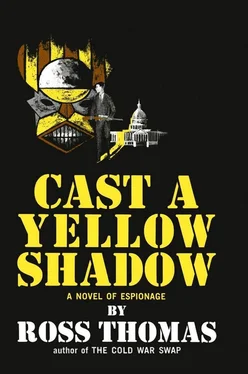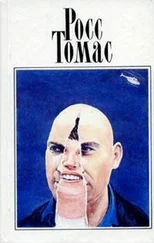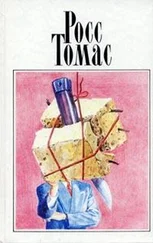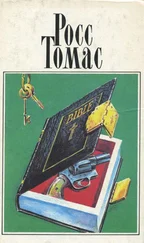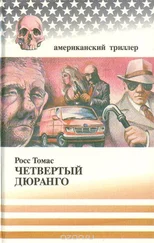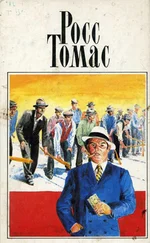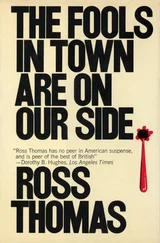“A note,” I said.
“A note,” he agreed.
“But not from Fredl.”
“No. It’s from whoever took her away.”
“A ransom note,” I said. I didn’t want to read it.
“Sort of.”
“How much do they want?”
Padillo saw that I didn’t want to read the note. He put it down on the coffee table.
“Not much,” he said. “Just me.”
I sat down in my favorite chair and looked at the carpet. Then I watched Padillo turn to Mush and say: “You may as well go on back. This will take a while.” I looked at Mush. He nodded his head. “Anything you want me to do?” he asked. He sounded interested.
“Nothing right now,” Padillo said.
He nodded his head again. “You know where to get in touch.”
“I know,” Padillo said.
Mush turned quickly and left. He closed the door and the lock barely made a noise as it clicked into place. I looked around the livingroom. The pictures were still on the walls, some that Fredl had brought from Germany, some I had brought, and some that we had decided on together in Washington and New York. The books were still in the bookcase that covered one wall. The furniture, an odd assortment, but comfortable, was still in place. Only a lamp had been upset. I liked the room. It had a couple of personalities in it. There was a small bar in one corner that was a facet of one of those personalities. I got up and walked over to it.
“Scotch?” I asked Padillo.
“Scotch.”
“What’s the note say?”
“You’d better read it.”
“All right. I’ll read it.”
I handed him the Scotch. He picked up the note and handed it to me. It was typed, single-spaced, undated, and unsigned.
Dear Mr. McCorkle:
We have taken Mrs. McCorkle into our custody. By this time you will have heard from your colleague, Mr. Michael Padillo, who was due to arrive in Baltimore this evening aboard the Frances Jane. When Mr. Padillo has performed the assignment which we have requested of him, we shall release Mrs. McCorkle quite unharmed.
We must caution you, however, not to inform the police or the Federal Bureau of Investigation, or any other law enforcement agency. If you do so, or should Mr. Padillo fail to carry out his assignment, we regretfully, but of necessity, will dispose of Mrs. McCorkle.
Mr. Padillo will be able to brief you fully about his assignment. The continued well-being of Mrs. McCorkle depends upon his willingness to cooperate. He has been uncooperative until now. We regret that we must use this method of persuasion.
I read it twice and then put it back on the coffee table. “Why Fredl?” I asked.
“Because I wouldn’t do it for money and they couldn’t find any other pressure. They’ve already tried.”
“Will they kill her?”
He looked at me and his dark Spanish eyes were steady and cold and curiously without reflection. “They’ll kill her no matter what I do.”
“Is she dead already? Have they already killed her?”
Padillo shook his head. “No. They haven’t killed her yet. They’ll use her for persuasion.”
I got up and walked over to the bookcase and ran a finger absently over the spines of a row of books. “Maybe I should yell,” I said. “Maybe I should scream and yell and pound the wall.”
“Maybe you should,” he said.
“I’ve read that it’s smarter to call the cops. Just call the cops and the FBI and let them take over. They go to school to learn about stuff like this.”
“If you call them, they’ll kill her. They’ll be watching you. They may have your phone bugged. You’ll have to meet the FBI or the police someplace. When you do, she’ll die. And then all you’ll have is a letter written on dime-store stationery with a rented typewriter and a dead wife.”
I took down a book and looked at it. I put it back and two seconds later I couldn’t remember its title. “You’d better tell me what it’s all about,” I said. “Then I’ll decide whether to call the cops or not.”
Padillo nodded and got up and went over to the bar and poured himself another drink. “I’ll do anything to get her back,” he said. “Anything. I’ll do what they want me to do or I’ll go to the police and the FBI with you — if you decide on that. Or we can try something else. You want another drink?” I nodded.
“But you have to make the decision,” he continued. “You have to decide what has to be done.”
He carried the drinks over to the coffee table and lowered himself carefully into a chair. He winced as he did it. The knife wound seemed to bother him.
“That night on the Rhine when I went over the side with Jimmy Ku,” he said. “Jimmy had never learned to swim. He drowned. I was shot in the left arm, but I made it to shore. I was sick, I was shot and I was damned tired. I heard you when they helped you up the bank. I wasn’t too far away. You finally flagged a truck, right?”
I nodded.
“It was while I was lying there that I decided to be dead for a while. I decided to be dead in Switzerland. I went to Zurich. It’s easy to be dead there. You don’t have to hear how I got to Switzerland.”
“Let’s just assume that you didn’t swim.”
“No. I went to Remagen first and found a doctor and then I went to Zurich. I kept in touch indirectly. I heard about the saloon getting blown up and I figured that you’d collect the insurance — we were over-insured anyway. So I sat in Zurich for a couple of months and did nothing. I was staying with a friend and the friend offered me a proposition.”
“In Africa.”
“That’s right. Africa. West Africa. We were in his office and he had a large map. He also had a large office. It seemed to my friend that several countries in West Africa would soon be in the market for small arms and he just happened to have a couple of warehouses that were full of them and only slightly used. He ticked the countries off for me: Ghana, Nigeria, Togo, Dahomey, perhaps the Cameroons, and so forth. He needed a traveling salesman. He had the list of hot prospects and all he needed really was an order-taker. If the prospects bought, fine. If they didn’t, somebody else would. I would get a straight salary — a high one.”
“You went,” I said.
Padillo nodded. “I flew to Guinea and sort of worked my way down the coast. I took orders from one faction one day and another faction the next. The product was good and my Zurich friend knew who was ripe for what. I pushed the 7.62 millimeter stuff. He was very strong on standardizing weaponry all over Africa. I made quite a few sales. If you’ve been reading the papers, you know where I made them.”
“I’ve kept up.”
“The last country I was in was quiet. It was just before Independence and my friend in Zurich thought I should stick around a few months, so he arranged for me to run a saloon that belonged to one of his business associates. The saloon was about fifty miles from nowhere. It was a dull wait, but my Zurich friend was convinced that it would pay off.”
“Did it?” I said.
Padillo nodded. “He had thought it would be even better than Nigeria and he was right. The military pulled a coup and those who escaped being shot made off with most of the treasury. They placed a rather large order. Togo was last on my list. It had been quiet there since Olympio was assassinated in ’sixty-three and my friend in Zurich thought things might be ripening.”
He paused and took a swallow of his drink. “On my way to Togo I went through Dahomey. I sent you a card.”
“You seemed to have had writer’s cramp that day.”
He smiled slightly. “Something like that. I was in this hotel in Togo — in Lomé — when they dropped by to see me.”
Читать дальше
